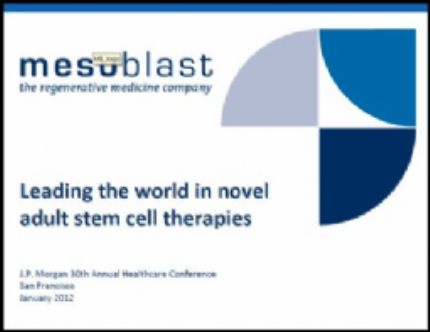
Mesoblast Limited (ASX:MSB) Receives Clearance To Begin First European Trial Of Allogeneic Or 'Off-The-Shelf' Stem Cell Treatment For Heart Attacks
Melbourne, Sep 5, 2011 AEST (ABN Newswire) - Global regenerative medicine company, Mesoblast Limited ( ASX:MSB), today announced that it had received clearance from the European Medicines Agency (EMA) to begin a 225-patient multi-center Phase 2 clinical trial in Europe for its lead cardiovascular product Revascor(TM) in conjunction with angioplasty and stent procedures to prevent heart failure after a major heart attack. Revascor(TM) is an allogeneic, or "off-the-shelf", adult stem cell product derived from Mesoblast's proprietary Mesenchymal Precursor Cell (MPC) platform technology which is being developed for use in a range of cardiovascular diseases including congestive heart failure, chronic angina, and heart attacks (acute myocardial infarction).
ASX:MSB), today announced that it had received clearance from the European Medicines Agency (EMA) to begin a 225-patient multi-center Phase 2 clinical trial in Europe for its lead cardiovascular product Revascor(TM) in conjunction with angioplasty and stent procedures to prevent heart failure after a major heart attack. Revascor(TM) is an allogeneic, or "off-the-shelf", adult stem cell product derived from Mesoblast's proprietary Mesenchymal Precursor Cell (MPC) platform technology which is being developed for use in a range of cardiovascular diseases including congestive heart failure, chronic angina, and heart attacks (acute myocardial infarction).
The placebo-controlled Phase 2 trial, AMICI (Allogeneic Mesenchymal precursor cell Infusion in myoCardial Infarction), is approved under Europe's voluntary harmonization procedure and will initially recruit patients at multiple European sites, including in the United Kingdom, The Netherlands and Belgium. Trial recruitment is subsequently expected to involve sites in additional European nations, Australia, and the United States. The primary endpoint of the study will be safety and efficacy at six months in heart attack patients who will receive either Revascor(TM) at one of two doses or placebo. Durability of effect will additionally be monitored for up to 36 months.
Heart attacks remain the biggest killer of people in the industrialized world. Every year, over 1.7 million people have a heart attack in Europe, and over 1.1 million in the United States. Most of these patients undergo an early angioplasty of the blocked artery accompanied by implantation of a metal stent to keep the artery open long-term. However, a significant number of the surviving patients subsequently become disabled with heart failure.
Revascor(TM) is injected by a simple intracoronary infusion at the same time as the angioplasty and stent procedure, within 12 hours of the heart attack. In preclinical trials, a simple intracoronary infusion of Mesoblast's off-the-shelf MPCs increased the number of blood vessels in the infarcted region, prevented scar formation, and significantly improved heart muscle function after a heart attack, preventing heart failure.
"The preclinical data were very compelling, and formed the basis for this innovative clinical trial," said the study's Principal Investigator, Professor Eric Duckers, M.D., Ph.D., Interventional Cardiologist, Head of Molecular Cardiology & Associate Professor, Thoraxcenter, Erasmus University Hospital in The Netherlands.
"We are excited to be pioneering a novel and minimally invasive clinical approach that has the potential to greatly improve the quality of life for patients suffering acute heart attacks," Professor Duckers added.
The UK's lead investigator, Dr Jonathan Hill, Consultant Interventional Cardiologist at King's College Hospital and King's Health Partners Academic Health Sciences Centre, said: "This stem cell product has the potential to change the medical paradigm for treatment of large heart attacks, and to provide for the first time a validated and effective off-the-shelf therapy for routine use."
Mesoblast Chief Executive Professor Silviu Itescu said the company was delighted to be progressing into a second major clinical indication for its proprietary stem cell product Revascor(TM), which is already well advanced in clinical development for congestive heart failure, with plans to expand its use for chronic refractory angina.
"If the preclinical results are reproduced in this trial, we will have a product that will make a significant impact on the lives of patients after a debilitating heart attack," Professor Itescu added.
Mesoblast has a strategic partnership with United States biopharmaceutical company Cephalon Inc. ( NASDAQ:CEPH) to commercialize Revascor(TM) for the broad treatment of cardiovascular diseases.
NASDAQ:CEPH) to commercialize Revascor(TM) for the broad treatment of cardiovascular diseases.
Notes:
1. King's College Hospital NHS Foundation Trust is a major centre for the treatment of heart attacks.
King's is one of the UK's largest and busiest teaching hospitals, with nearly 7,000 staff providing around 1,000, 000 patient contacts a year. King's has a unique profile, with a full range of local hospital services for people in the London boroughs of Lambeth and Southwark as well as specialist services to patients from further afield. The Trust is recognized internationally for its work in liver disease and transplantation, neurosciences, cardiac, haemato-oncology, stroke and major trauma. King's also plays a key role in the training and education of medical, nursing and dental students with its academic partner, King's College London. For more information, visit http://www.kch.nhs.uk
2. King's College Hospital and Guy's and St Thomas' are both part of King's Health Partners Academic Health Sciences Centre (AHSC), a pioneering collaboration between King's College London, and Guy's and St Thomas', King's College Hospital and South London and Maudsley NHS Foundation Trusts. King's Health Partners is one of only five AHSCs in the UK and brings together an unrivalled range and depth of clinical and research expertise, spanning both physical and mental health. Our combined strengths will drive improvements in care for patients, allowing them to benefit from breakthroughs in medical science and receive leading edge treatment at the earliest possible opportunity. For more information, visit http://www.kingshealthpartners.org
Contact
Julie Meldrum
Corporate Communications Director
T: +61-3-9639-6036
C: +61-419-228-128
Email:julie.meldrum@mesoblast.com
| ||
|










